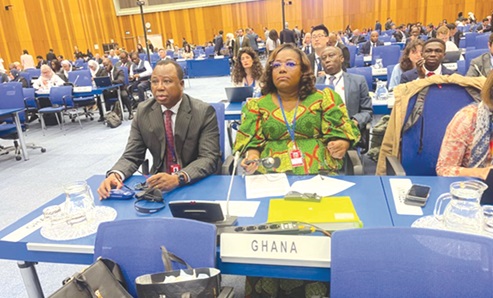Deputy Chief of Staff, Nana Oye Bampoe Addo, has led a delegation from the country to the First Resumed Sixteenth Session of the United Nations Convention Against Corruption (UNCAC) Implementation Review Group (IRG) in the Austrian capital, Vienna.
The delegation also participated in the Open-Ended Intergovernmental Working Group on the Prevention of Corruption in Vienna.
Ms Bampoe Addo delivered statements at the joint events, highlighting the country’s strong anti-corruption framework.
She cited the 1992 Constitution and key legislation such as the Criminal Offences Act, Financial Intelligence Centre Act, Office of the Special Prosecutor Act, Whistleblower Act, and Witness Protection Act as part of a framework the country uses to address corruption.
The deputy chief of staff also emphasised the National Anti-Corruption Action Plan (NACAP I & II), with NACAP II scheduled for launch in September 2025 and the new “Operation Recover All Loot” (ORAL) initiative.
The deputy chief of staff, who was in the company of the Presidential Advisor for the National Anti-Corruption Programme, Professor Francis Dodoo; the Commissioner of Human Rights and Administrative Justice (CHRAJ), Joseph Whittal and the Director of Strategy, Research and Communication, Office of the Special Prosecutor, Samuel Appiah Darko, also reported tangible results.
For instance, Ms Bampoe Addo said over $340,000 had been recovered by the Special Prosecutor, $11.5 million had been saved through blocked inflated contracts and $1.55 billion had been recovered by the Audit Service from 2020 to 2023.
She emphasised citizen engagement, reaching over 15 million Ghanaians through sensitisation programmes and announced the formation of a Governance Advisory Council to supervise compliance and publish yearly governance reports.
Ms Bampoe Addo also highlighted the government’s reforms, including banning political appointees from acquiring state assets, enacting the Conduct of Public Officers Bill, establishing special courts for corruption cases, and strengthening the Auditor-General’s powers as part of a range of measures to prevent and address corruption.
She emphasised Ghana’s dedication to financial integrity and anti-money laundering efforts, highlighting digital reforms such as the Ghana Electronic Procurement System (GHANEPS) and E-VAT, which had boosted Value Added Tax (VAT) revenue by 28 per cent.
Ms Bampoe Addo invited the international community to join Ghana’s anti-corruption fight, stating, “corruption has no place in Ghana’s future.”
Background
The resumed process of the United Nations Convention Against Corruption (UNCAC) Implementation Review Group (IRG) and the Open-Ended Intergovernmental Working Group on the Prevention of Corruption aims to evaluate and enhance the practical execution of anti-corruption commitments among member states.
It provides a platform for countries to exchange progress, challenges and best practices. It also promotes peer review and technical support to ensure domestic laws and institutions meet international standards for preventing, detecting and prosecuting corruption.
This process improves transparency, responsibility and collaboration in the worldwide fight against corruption.

